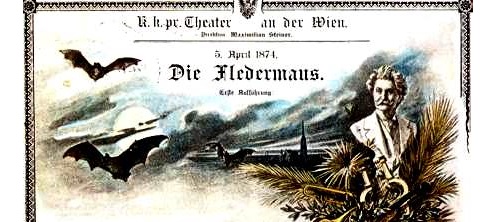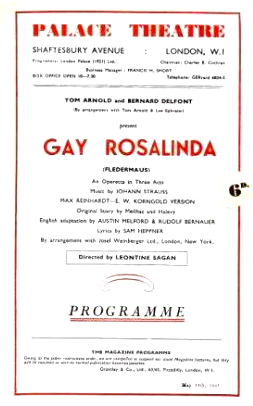
Die Fledermaus est sans conteste le grand chef-d’oeuvre de Johann Strauss et l’opérette viennoise par excellence. Sur fond de désastre économique et social, Strauss compose, en 1874, cette oeuvre emplie d’allégresse et de vitalité, dans laquelle airs brillants et valses, certaines parmi les plus célèbres du répertoire, dominent la pièce. Les personnages se retrouvent au coeur d’un bal masqué à Vienne, et sous son déguisement, chacun recherche l’ivresse et l’exaltation de l’amour et de la séduction. Après plusieurs quiproquos et supercheries, tous s’entendent pour blâmer le « Roi Champagne », cause de toutes les incartades. L’oeuvre, adaptée d’après la pièce française Le Réveillon, est traditionnellement jouée à Vienne, chaque année, le soir du 31 décembre.

Version 4
Fledermaus (Die) (1945-03-Palace Theatre-London)
Type de série: RevivalThéâtre: Palace Theatre (Londres - Angleterre) Durée : Nombre : 412 représentationsPremière Preview : jeudi 08 mars 1945Première : jeudi 08 mars 1945Dernière : InconnuMise en scène : Bernard Delfont • Leontine Sagan • Chorégraphie : Wendy Toye • Producteur : Avec : Cyril Ritchard (Baron von Eisenstein), Ruth Naylor (Rosalinda), Peter Graves (Orlofsky), Bernard Clifton (Dr Falke), James Etherington (Alfred), Jay Laurier (Frosch)Commentaires : On April 5th 1874 Vienna’s Theater an der Wien saw the premiere of “Die Fledermaus” with music by Johann Strauss II. It was based on a French play by Meilhac & Halevy and set to a German libretto by Karl Haffner & Richard Genee. It was soon recognised as the greatest of all Viennese operettas to date and it remains the golden standard by which all other operettas are measured even today.
By the end of that same year it had been performed in New York, and it first appeared in London at the Alhambra on December 18th 1876 in a rather heavily adapted version. In the early years of the 20th Century it began to appear in the repertoire of the world’s great opera houses, and was first performed at the Royal Opera House, Covent Garden in 1931.
In 1942 the famous German director, Max Reinhardt, staged a revival on Broadway under the title “Rosalinda”, and this was a triumph, running for 502 performances. This version, with musical arrangements by Erich Korngold was adapted for London by Austin Melford and Rudolf Bemauer - and was a great success, running for a year, closing on March 2nd 1946.
Gabriel von Eisenstein doit aller en prison y purger une courte peine pour outrage. Son ami Falke lui conseille de se rendre malgré tout, et à l’insu de sa femme Rosalinde, au bal masqué du prince Orlofsky. Rosalinde a prévu de recevoir entre temps son amant Alfred. Mais ce plan est contrecarré du fait qu’ Alfred est écroué par le directeur de la prison à la place d’Eisenstein. Rosalinde se rend elle aussi au bal d’Orlofsky… où Eisenstein met tout en oeuvre pour séduire une beauté inconnue, masquée qui lui subtilise sa belle montre. Le lendemain, Eisenstein s’annonce à la prison où Alfred est enfermé à sa place. Et les relations étranges sont toutes élucidées : il apparaît qu’Eisenstein a séduit sa propre femme (ce que prouve la montre). On passe l’éponge sur cet épisode et le champagne est déclaré coupable de tout…
Die Fledermaus (en français, La Chauve-Souris) est une célèbre opérette viennoise de Johann Strauss II composée en 1874 et créée au Theater an der Wien de Vienne le 5 avril 1874.
À la base du livret, une pièce autrichienne de 1851, Das Gefängnis (La Prison) adaptée par Henri Meilhac et Ludovic Halévy en 1872 sous le titre "Le Réveillon". L'œuvre retourne à Vienne, où l'histoire est transformée par Richard Genée et Karl Haffner. Strauss achève la partition en 42 jours. Créée en français à Paris le 30 octobre 1877 sous le titre La Tzigane, dans une version remaniée de Delacour et Wilder, elle ne rencontre le succès qu'à partir de 1904 dans une nouvelle adaptation de Paul Ferrier.
La Chauve-Souris (en français)
Gay Rosalinda (en anglais)
Overture
Introduction
Trio - Rosalinda, Eistenstein, Dr. Blind - "When your advocate's a ninny … "
Duet - Eisenstein, Falke - "It's the talk of the town … "
Trio - Rosalinda, Adele, Eisenstein - "And must I live eight long days … "
Finale I - "Drain a draught of wine with me … "
Introduction - Chorus - "What a feast, what a spread … "
Couplets - Orlofsky - "I always feel beholden to the guests whom I invite … "
Ensemble and Couplets - Orlofsky, Falke, etc - "How absolutely splendid … "
Duet - Eisenstein, Rosalinda - "What a tonic, what a beauty … "
Csardas - Rosalinda - "Music of childhood … "
Finale II - all soloists and chorus- "The glint of champagne glasses … "
Ballet
Entr'act
Melodrama - Frank - "Here's a health your highness … "
Couplets - Adele, Ida-Frank - "Picture a coy village maiden … "
Trio - Rosalinda, Alfred, Eisenstein - "I have a suspicion … "
Finale III - Company - "O Fledermaus, old Flittermouse … "
Aucun dossier informatif complémentaire concernant Fledermaus (Die)

Version 1
Fledermaus (Die) (1874-04-Theater an der Wien-Wien)
Type de série: OriginalThéâtre: Theater an der Wien (Vienne - Autriche) Durée : Nombre : Première Preview : jeudi 01 janvier 1970Première : jeudi 01 janvier 1970Dernière : InconnuMise en scène : ???? ???? • Chorégraphie : ???? ???? • Producteur : Avec : Jani Szika, Marie Geistinger, Karoline Charles-Hirsch

Version 2
Fledermaus (Die) (1874-11-Stadt Theatre-Broadway)
Type de série: Original BroadwayThéâtre: Stadt Theatre (Broadway - Etats-Unis) Durée : Nombre : Première Preview : jeudi 01 janvier 1970Première : jeudi 01 janvier 1970Dernière : InconnuMise en scène : ???? ???? • Chorégraphie : ???? ???? • Producteur :

Version 3
Fledermaus (Die) (1876-12-Alhambra Theatre-London)
Type de série: Original LondonThéâtre: Alhambra Theatre (Londres - Angleterre) Durée : Nombre : Première Preview : jeudi 01 janvier 1970Première : jeudi 01 janvier 1970Dernière : InconnuMise en scène : ???? ???? • Chorégraphie : ???? ???? • Producteur :

Version 4
Fledermaus (Die) (1945-03-Palace Theatre-London)
Type de série: RevivalThéâtre: Palace Theatre (Londres - Angleterre) Durée : Nombre : 412 représentationsPremière Preview : jeudi 08 mars 1945Première : jeudi 08 mars 1945Dernière : InconnuMise en scène : Bernard Delfont • Leontine Sagan • Chorégraphie : Wendy Toye • Producteur : Avec : Cyril Ritchard (Baron von Eisenstein), Ruth Naylor (Rosalinda), Peter Graves (Orlofsky), Bernard Clifton (Dr Falke), James Etherington (Alfred), Jay Laurier (Frosch)Commentaires : On April 5th 1874 Vienna’s Theater an der Wien saw the premiere of “Die Fledermaus” with music by Johann Strauss II. It was based on a French play by Meilhac & Halevy and set to a German libretto by Karl Haffner & Richard Genee. It was soon recognised as the greatest of all Viennese operettas to date and it remains the golden standard by which all other operettas are measured even today.
By the end of that same year it had been performed in New York, and it first appeared in London at the Alhambra on December 18th 1876 in a rather heavily adapted version. In the early years of the 20th Century it began to appear in the repertoire of the world’s great opera houses, and was first performed at the Royal Opera House, Covent Garden in 1931.
In 1942 the famous German director, Max Reinhardt, staged a revival on Broadway under the title “Rosalinda”, and this was a triumph, running for 502 performances. This version, with musical arrangements by Erich Korngold was adapted for London by Austin Melford and Rudolf Bemauer - and was a great success, running for a year, closing on March 2nd 1946.

Version 5
Fledermaus (Die) (1946-08-Princes Theatre-London)
Type de série: RevivalThéâtre: Shaftesbury Theatre (Londres - Angleterre) Durée : Nombre : Première Preview : jeudi 08 août 1946Première : jeudi 08 août 1946Dernière : InconnuMise en scène : Bernard Delfont • Leontine Sagan • Chorégraphie : Wendy Toye • Producteur : Commentaires longs: This was the same production which had ended its year long run at the Palace just five months earlier and had been on a highly successful provincial tour ever since. It was back in London for a six week season before returning to its tour. There had been a number of cast changes since the original production, and the orchestra was now conducted by Michael Collins and not Richard Tauber.
Pas encore de video disponible pour ce spectacle

.png)
.png)




